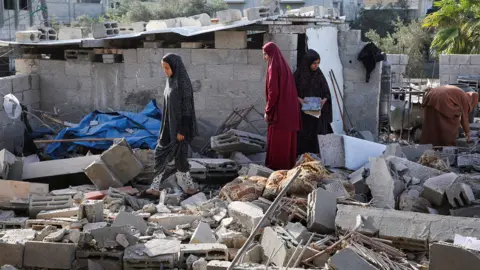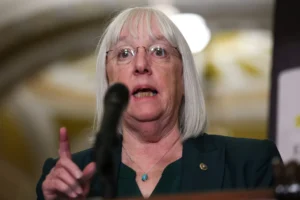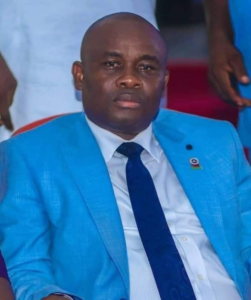Tens of thousands of Israelis rallied late into the night calling for a deal to bring hostages home, ahead of further ceasefire talks.
Protesters in Tel Aviv chanted “war is not holy, life is”, with some accusing Prime Minister Benjamin Netanyahu of aiming to prolong the conflict in Gaza.
It came as a Hamas delegation met mediators in Egypt on Saturday.
The group said there were no new developments, but added “a new round will begin” on Sunday.
Negotiators have resumed long-running ceasefire talks in Cairo – brokered by Egypt and Qatar – on pausing Israel’s offensive in Gaza in return for freeing hostages.
The main sticking point appears to be whether the deal would be temporary or permanent.
It is thought the wording being discussed involves a 40-day pause in fighting while hostages are released, and the release of a number of Palestinian prisoners being held in Israeli jails.
An adviser to the Hamas leader Ismail Haniyeh said the group was looking at the latest proposal with “full seriousness”.
But he repeated a demand that any deal would have to explicitly include an Israeli withdrawal from Gaza and complete end to the war.
In an interview with the BBC, Israeli minister Amichai Chikli said the war will continue “until Hamas is eliminated”. “We don’t have the option to agree to a deal that includes ending the war or giving up a full-scale operation in Rafah,” he added.
Separately, an anonymous Israeli government official told local media on Saturday that Israel would “under no circumstances agree to end the war as part of an agreement to free our abductees”.
They added: “The IDF will enter Rafah and destroy the remaining Hamas battalions there – whether there is a temporary pause to free our captives or not.”
Mr Netanyahu has faced pressure from within his far-right coalition to press ahead with the long-promised offensive in Gaza’s southern-most city, where an estimated 1.4 million people have taken shelter after fleeing fighting in northern and central parts of the strip.
The US – Israel’s biggest diplomatic and military ally – is reluctant to back a new offensive that could cause significant civilian casualties, and has insisted on seeing a plan to protect displaced Palestinians first.

Saturday’s demonstrations in Israel were the latest display of the increased domestic pressure Mr Netanyahu is facing to secure the return of the hostages.
Of the 252 who were kidnapped by Hamas on 7 October, 128 are still unaccounted for – and among them, at least 34 are presumed dead.
Natalie Eldor, a protester in Tel Aviv, told Reuters news agency she was there to “support a deal now, yesterday”.
“We need to bring all the hostages back, the live ones, the dead ones. We got to bring them back. We got to switch this government,” she added.
Some who gathered at the Kirya military base in Tel Aviv accused the prime minister of undermining the proposed truce, while others called for an end to the war.
Addressing the prospects of a truce on Saturday, minister Benny Gantz, a member of Israel’s war cabinet, said: “An official response to the outline has not yet been received. When accepted – the war management cabinet will meet and discuss it.
“Until then, I suggest to the ‘political sources’ and all decision-makers to wait for official updates, to act calmly and not to get into hysteria for political reasons.”
Ceasefire talks have gone on for months without a breakthrough, and there has not been a pause in fighting or a release of hostages since the end of November.
There have been moments at which a new agreement has seemed imminent – only to fall through before being signed.



























